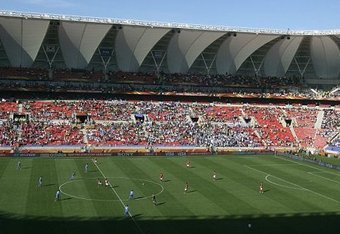Since returning from South Africa, I have been wondering whether anyone was going to take a bath as a result of empty hospitality seats at the World Cup.
Actually, I’m still wondering, but at least now I have more information to go on following a conversation with Peter Csanadi, Head of Marketing at Match Hospitality AG.
Match is the Zurich-based corporation that, according to FIFA’s latest financial report, was granted the hospitality rights for the 2010 World Cup for $120 million.
According to Csanadi, Match is owned by four shareholders: Byrom Holdings with 65 percent; Dentsu (25 per cent); Infront Sports & Media (5 per cent); and Bidvest (5 per cent).
What Csanadi would not do was tell me how much Match had made or lost from its World Cup rights.
“Our books are not public information,” he told me.
“We have an internal agreement that we do not discuss revenues and profits or losses publicly.”
However, he admitted that initially they had hoped for bigger sales and blamed the global economic crisis for the shortfall.
“Obviously, in the beginning, we were hoping to sell more. That is very clear,” he said.
“The global economic crisis was a big blow to the hospitality industry and the timing was worst for the 2010 World Cup because the crisis hit during the main sales phase.
“What is more, the finance sector was the worst hit by the crisis.
“In the past, this sector had bought big and bought early.
“So we lost some of our biggest and earliest buyers.
“Some finance companies had already bought packages before the crisis hit, but some of those then went bankrupt.
“It was a big, big, big challenge.
“Who would have thought in 2007 that Lehman Brothers was not going to be around in 2009?
“Nobody.
“It was very difficult, but we are still here and we delivered a programme which was very high quality.
“It was still the second-largest hospitality programme ever in sports, after the 2006 World Cup.”
 Csanadi also cautioned that just because seats appeared empty during World Cup games, it did not necessarily follow that they had not been sold.
Csanadi also cautioned that just because seats appeared empty during World Cup games, it did not necessarily follow that they had not been sold.
““The empty seats were a slightly different problem because many factors contributed to that,” he argued.
“Just because they were empty, that doesn’t mean they weren’t sold.
“There was a package, for example, consisting of as many as 34 matches in five stadia.
“It obviously can happen that someone who bought that package wouldn’t go to every match.
“All seats in Cape Town, for example were sold, but we still had some empty seats in the suites…In Rustenburg, all suites were sold for all matches.
“There is another factor: in some venues a lot of suites were busy inside, but people didn’t go out and sit in the seats in front of the box once the match started.
“Ellis Park and Loftus Versfeld have an unusually high number of suites.
“This makes them difficult to sell or even to service.”
Finally, Csanadi disclosed that in total “over 140,000 people bought hospitality packages – and we ran FIFA’s VIP programme as well”.
“He said this compared with “between 225,000 and 230,000” in Germany in 2006.
“But that was in the middle of Europe; this was in Africa.”
So where does that leave us?
Well, by my reckoning, if 140,000 people bought packages, Match would have needed to make an average of around $850 per individual just to cover the $120 million rights fee to FIFA.
And this calculation takes no account of transport, hotels, food and drink.
Then again, when I put this to Csanadi he replied that the average hospitality package price was “a lot higher than $1,000”.
And there we will have to leave it for the time being.
David Owen is a specialist sports journalist who worked for 20 years for the Financial Times in the United States, Canada, France and the UK. He ended his FT career as sports editor after the 2006 World Cup and is now freelancing, including covering the 2008 Beijing Olympics and 2010 World Cup. Owen’s Twitter feed can be accessed at www.twitter.com/dodo938

.jpg)